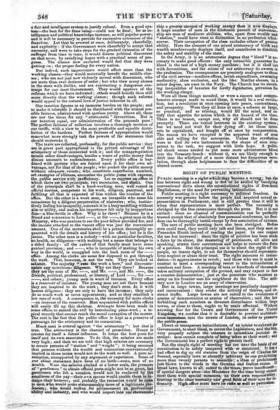RIGHT OF PUBLIC MEETING.
Poetic meeting-is a right whichAnay become a wrong; but the line between right and wrong is. tint to' be settled by bandying conventional dicta about, the constitutional rights of free-born Englishmen, or the need for preventing intimidation. Public meeting is a right necessary to political freedom. Its necessity was 'greater before the people had acquired actual re- presentation in Parliament, and is still greater than it will be when that representation i8 more perfect. The necessity is abridged by the free intercourse through the press. But it is not extinct : since no channel of communication can be perfectly trusted except that of absolutely free personal conference, no free- dom can be thoroughly tested except by free association of citizens.
The uses of public meeting have also been abridged. Before men could read, they could only talk and listen, and they met on Penenden Heath instead of reading the paper. In one respect the use has increased : since the right of petition has been made a farce by its abuse, the mustering of petitioners, all alive and speaking, attests their earnestness and helps to restore the force of a petition. But the principal use is to attest the right of the people, an innate right, to act for themselves should representa- tives neglect or abuse their trust. The right amounts to intimi- dation—it approximates to revolt ; and those who use it must be content to meet a corresponding resort to the intimidation of numbers and force. A meeting of tens or hundreds of thousands takes military occupation of the ground, and may expect to face a_ counter-demonstration ; just as the potentate who musters an army on his frontier sees his neighbour do the like. The mili- tary now in London are an army of observation.
But in large towns, large meetings are peculiarly dangerous and inconvenient : they evoke the activity of thieves, and ob- struct traffic. Large towns are not suited to the evolutions of armies of demonstration or armies of observation ; and the law forbidding such numbers. as threaten disturbance within large towns, or close to them,, ought to be made effectual. Without avowing fear for the Crown and Government of the United Kingdom, we confess that it is desirable to prevent multitudi- nous incursions into the streets of London, in order to preserve the public peace. Direct or transparent intimidations, of an intent to subvert the Government, to shed blood, to coerce the Legislature, and the like, very properly subject the utterers to immediate judicial re- straint: men cannot complain of being taken at their word ; and the Government hae a perfect right to protect itself. But the simple right of meeting lies too near the basis of our constitution to be safely tampered with or restricted. It has bad effect to dig up old statutes from the reign of Charles the Second, especially laws so absurdly arbitrary as one prohibiting more than twenty persons to assemble ; a class of prohibitions just blown to the winds in the German and Italian states. If broad laws, known to all, suited to the times, prove insufficient— if special dangers arise—the Ministers for the time being should meet them with special measures, on their own responsibility; trusting to the clear necessity and good faith of their acts for in- demnity. High office must have its risks as well as patriotism.


























 Previous page
Previous page